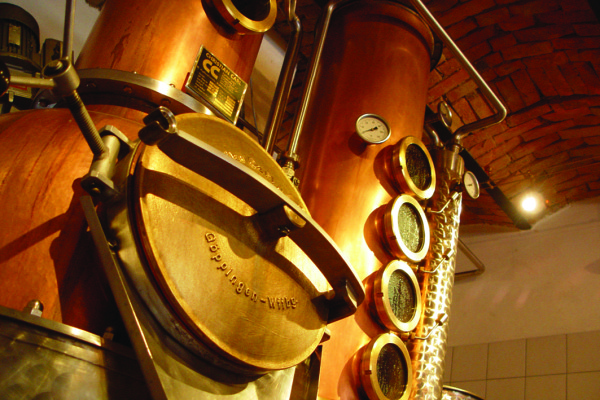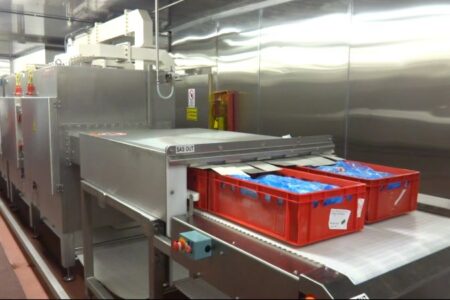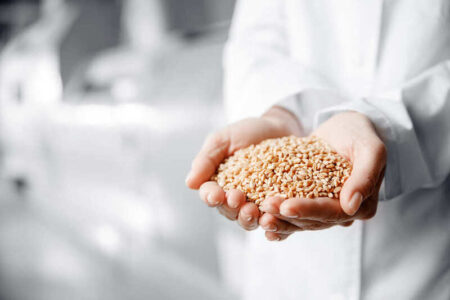Filter out

Food & Drink Technology looks at the use of Eaton filtration solutions in the production of Georg Hiebl distillery’s award-winning distillates…
Schnapps distillation has been a tradition for generations at the Hiebl family farmhouse in Austria’s Mostviertel region. Today, George and Robert Hiebl place particular focus on the quality of their distillates. They pay a great deal of attention to the maturity and condition of raw ingredients and employ a selective, individual filtration principle.
Their philosophy and strategy serve them well. Since 1997, the quality focused approach of Georg Hiebl Distillery in Haag, Lower Austria, has resulted in several hundred awards — and counting. To do so, the company relies on filtration products and solutions from Eaton.
Quality distillates
In 1993, Georg Hiebl took over the distillery from the family agricultural business and, together with his brother Robert, gave it a new economic direction: producing quality distillates.
In 1997, the company purchased a 150L rectification distillery plant and built a new mashing room. To ascertain the level of quality of the products at the time, the brothers entered four product samples at the Destillata fine spirit awards. Winning one silver and two bronze medals on the first visit was evidence that the company was already well on its way.
More success soon followed; as early as 1999, the company won its first gold medal and since then has been established in the winners’ circle and has taken the overall prize on several occasions. In 2013, it entered 52 samples and received 51 medals – 19 of them gold – winning such awards as Distillates of the Year and even gaining record breaking maximum points in some categories.
The distillery’s unprecedented success in German speaking countries was soon followed in international competitions, such as the International Wine and Spirit Competition in London, where the Hiebls were named Boutique Distiller of the Year 2014.
The secret of the business’ success, say the Hiebls, lies in choosing the best raw ingredients, thorough fermentation and distillation processes and the use and specific combination of filtration solutions from Eaton’s filtration division.
Products, processes and the right instinct
In terms of the raw ingredients, which come primarily from the surrounding region, the ripeness of pomes, stone fruits and soft fruit is a decisive quality criterion for fine spirits. The best distillates can only be produced with a high quality base product, such as fully ripe, healthy and clean fruit.
After sorting and crushing the fruits, they are mashed, enzymes added, acidified and fermented with yeast.
After alcoholic fermentation, the actual distillation process begins, during which the alcohol is removed from the mash by distillation and concentrated. This process is divided into the fore run, middle run and last run; the middle run is the actual distillate.
An important factor during distillation is the time; only with patience and experience is it possible to achieve the best results. The heating process is particularly slow to ensure that during the fore run, only the highly volatile and unwanted substances such as acetic acid esters and acetaldehyde are separated. If the master distiller heats too strongly during this process step, they will lose valuable flavours that absolutely must be preserved for the subsequent middle run. It is therefore important to heat at a constant rate. It is this part of the process which contains the value adding and desired elements, such as aroma compounds and potable alcohol.
The subsequent last run contains higher boiling elements and is undesirable for the high quality of the end product and must be separated during distillation. During the filtration process which follows the subsequent distillate storage and adjustment to drinking strength, the Hiebl distillery relies on Eaton filtration solutions.
“For this process, it is crucial to have a wide range of graded filter sheets available that we can select and combine,” explains Georg Hiebl. “We rely on the extensive range of filtration solutions from Eaton and we are also always very well advised and informed about the latest developments, which is of added value to our high standards.”
Filtration solution
Apart from a few exceptions, the majority of products are filtered. Beco Select A depth filter sheets and filters from the Beco standard range are used to remove the unwanted substances from the distillate. They are used for the sophisticated filtration of high quality spirits and offer distillers consistency in colour, flavour and aroma.
The Select A depth filter sheets, with a nominal separation rate of 0.8 microns or 2.5 microns, are ideal for aroma preserving filtration. This is achieved due to the high adsorption capacity for long and medium chain fatty acid esters that cause hazing at higher filtration temperatures, the low adsorption of value adding, short chain fatty acid esters, and the high absorption capacity for fusel oils and essential oils. They also allow a secure separation of finely colloidal to coarsely dispersed solids and minimise crystalline precipitates such as calcium and magnesium hazing, metal hazing and carbon particles.
The depth filter sheets thereby facilitate the pore structure and the use of high quality raw materials. They are made from pure and natural materials with cationic charge carriers, such as finely fibrillated cellulose fibres from deciduous and coniferous woods, diatomaceous earth and perlites. They also have a low content of calcium, magnesium and iron ions in order to avoid secondary hazing and allow for a colour preserving filtration as there is minimal colour adsorption in the depth filter sheet.
This is an important aspect because the preservation of the natural colour of cask aged distillates, liqueurs or other coloured spirits enhances their optical quality.
The Beco standard depth filter sheets from Eaton provide a complete gradation in a retention range of 0.1 microns to four microns. These grades allow the filters to adapt very precisely to the respective individual requirements. They are used for coarse to fine filtration and thanks to their large volume cavity structure, they have a high dirt holding capacity and are therefore ideal for the filtration of coarse to very fine particles.
At the Georg Hiebl distillery, this filtration is carried out in aroma preserving temperatures between 4-8°C, sometimes with very coarse filters. Two to five different filter strengths are used in each distillation and the filtrate is tested by means of blind tasting.
It then becomes clear which filters and filter combinations are ideal for the particular requirements of each distillate. This is because the suitable filter strength depends on many individual factors, such as the type and variety of fruit, mechanical processing, enzymatic digestion, strength and duration of mixing, as well as the strength and method of distillation.
So that the distillates remain stable when using coarser sheets, which only filter very slowly, a very gentle pump is used to carry out the filtration process at a correspondingly low pressure.
The ultimate goal of the Hiebl brothers is to further improve the existing scent and flavour of the distillate, thereby achieving excellent results by means of a specifically attuned filtration.
Aroma concealing secondary tones, known as veils, and a bitter sensation, which overwhelms the palate, are reduced as flavour and odour are conserved, and mild to moderate bitter notes that enhance richness should be preserved. It is also important to maintain the sharp, fruity pressure on the palate, such as in the Williams Christ pear brandy.
“With the Beco Select A depth filter sheets and the Beco standard range from Eaton, we have succeeded in exactly what we want to achieve in filtration – getting the best results from fine distillates,” adds Georg Hiebl.
Very fine indeed
These requirements are achieved thanks to Eaton filtration solutions and its selective use based on extensive knowledge of the Hiebls. This successful combination has been recognised and honoured hundreds of times over.
The distillery has reached its initial goal, and will continue to pursue it: producing the finest distillates. In the process, it becomes particularly clear that, due to the time factor, which is also affected by the low rate of filtration, essential roles are played by temperature, selection and the combination of filter sheets.
Thanks to the Hiebl brothers’ ability to specifically adapt these parameters, they create products with a great deal of flavour and aroma, a special sensory experience and high stability against cloudiness, resulting in distillates that are pure and clear with a track record for impeccable quality.



